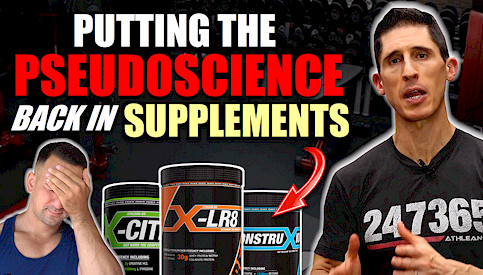ATHLEAN-X SUPPLEMENTS REVIEW (SCIENCE-BASED BREAKDOWN)
Like a number of other fitness YouTubers, Jeff Cavailiere from Athlean-X is also into the supplement game. But as popular as his YouTube channel is, are his supplements any good?
In this article, I’ll be doing a no nonsense, science based review of Jeff Cavaliere’s supplement line “Athlean-RX.”
I’m going to break down in step-by-step, irrefutable detail why these products are, on the whole, very poorly formulated, offensively overpriced, and not at all based on “science” like the website claims.
Jeff’s motto on YouTube is “putting the science back in strength,” and people can debate back and forth about how accurate that particular claim is. But as far as supplementation goes, this is definitely not his area of expertise. The following review will answer why.
Athlean-X Protein Powder: X-LR8
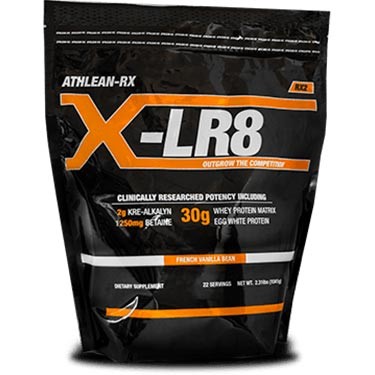
The first Athlean-X supplement on the list is “X-LR8.” This is a post workout protein where Jeff is charging 60 dollars per bag for 22 servings. That’s nearly 3 dollars per serving.
At that price point, there must be something really special about this protein powder. Let’s have a look.
To begin, there are 30 grams of protein per serving from a combination of whey isolate, whey concentrate, and egg white protein. Nothing wrong with that at all, assuming the label is accurate.
If he had stopped right there, and then actually charged a reasonable price for this, there’d be no issue at all. Instead, he throws in some additional, poorly thought out ingredients and then uses that to justify charging around double the price of what this should actually cost.
Kre-Alkalyn
First off he adds Kre-Alkalyn, which is supposedly an “advanced” form of creatine that Jeff incorrectly claims is superior to creatine monohydrate. (Check out my article on how to take creatine to find out why creatine monohydrate is all you need).
In reality, Kre-Alkalyn is NOT more effective than creatine monohydrate in any way, and this was shown in the research going all the way back to 2012.
In a study published in the Journal of the International Society of Sports Nutrition, researchers found that, “Kre-Alkalyn supplementation does not promote greater changes in muscle creatine content, body composition, or training adaptations in comparison to creatine monohydrate.”
The double-blind study took place over 28 days. 36 resistance-trained people were assigned to supplement with creatine—at random between creatine monohydrate, a manufacturer’s recommended dose of Kre-Alkalyn, and a higher dose of Kre-Alkalyn to match the standard doses of monohydrate (a loading dose of 20g/day in the first week, then 5g/day in the following weeks).
The researchers found that after the 28 day period, fat free mass index increased, body fat percent decreased, and 1RM in the bench press increased among all groups in the study.
Yet, they concluded that neither manufacturer recommended doses, nor equivalent “loading” doses of Kre-Alkalyn, promoted greater changes in the participants than creatine monohydrate.
So, with these findings not supporting the claim that Kre-Alkalyn is “superior” to creatine monohydrate, I’m not really sure where Jeff is getting his information.
I honestly don’t know of any well known supplement brands that still sell Kre-Alkalyn nowadays. Most people know it’s not necessary.
There’s nothing wrong with Kre-Alkalyn itself because it’s actually 98% creatine monohydrate. But because of that, you don’t need to be paying the over-inflated price for it.
I think it’s pretty funny how Jeff claims that his supplements are based on “cutting edge nutrition science,” and the website even says, “most supplement companies never update their formulas to reflect the latest nutrition research… we do!” Well, you’re about 10 years late on this one, Jeff.
Also, for the record, no other forms of creatine have ever been shown in research to be superior to basic creatine monohydrate. So, given that monohydrate is by far the most cost effective, that’s the form you should stick to.
Side note about creatine and supplement dosages…
Creatine is actually a combination of 3 amino acids: arginine, glycine, and methionine. Because individual amino acids register as “protein” when protein powders are tested for their nutrition labels (since it’s based on the total nitrogen content), those 2 grams of creatine will actually count as protein, and sometimes as even more.
Creatine can register as up to almost 150% protein—not a huge deal here as the difference is small, but you’re probably getting more like 27 or 28 grams of protein rather than the labeled 30.
If you’re buying a protein powder that has say 5 grams of creatine in it, that could be accounting for as much as like 7-8 grams of the protein total. This is something you should be aware of because a lot of companies do this on purpose, since gram-for-gram creatine ends up being cheaper than using whole proteins.
If you see creatine listed on a protein powder ingredient label, I would recommend avoiding that particular product.
Betaine Anhydrous
Jeff also adds betaine anhydrous to his protein powder, which is a pretty borderline ingredient in my opinion.
It does have some research showing increases in overall training performance. But as far as I know, almost every study showing those benefits was sponsored by DuPont Nutrition—who also happens to be the world’s largest supplier of betaine.
This doesn’t automatically mean those studies are false. Yet when other independent studies have been done, researchers haven’t been able to replicate those findings in most cases, so keep that in mind.
Further, the mechanism of action between betaine and creatine overlaps. Even if there is a benefit to betaine supplementation, it’s possible that you’re already getting it from creatine anyway. On top of that, the proper dose for betaine is usually 2 and a half grams, whereas Jeff is using half of that here.
Now maybe that’s under the assumption that you’ll be using his other products as well that also have betaine in them, and so when combined with another Athlean-X supplement, you’ll end up with enough.
However, if you’re using this product alone, or one of his other products alone, then you won’t be getting the proper dose.
Wait…there’s more?
Lastly, for some very bizarre reason, he adds 500 milligrams of waxy maize starch. This is a carb source bodybuilders used way back in the day for post-workout recovery.
It’s like Jeff is stuck in the early 2000’s here as pretty much no one uses or talks about waxy maize anymore.
There’s no research showing anything special about it, and it doesn’t matter anyway because half a gram is virtually nothing to begin with. Essentially, you could take one bite of oatmeal and get more carbs than that. So this ingredient is just purely for label decoration, and it makes zero sense whatsoever.
So all in all, if you’re using “X-LR8” as a basic protein powder, then to each their own. But, the price is just stupidly high for what it is, and the extra ingredients Jeff and his team have thrown in here are mostly useless and they don’t even remotely justify the higher cost.
The only thing this product is truly going to accelerate is Jeff Cavaliere’s bank account, and you’ll be way better off to just buy a standard protein powder for half the price.
Athlean X Post-workout: Reconstruxion
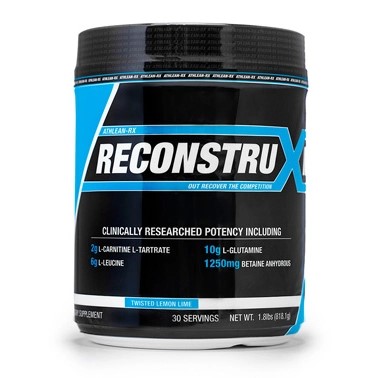
Next up is “RECONSTRUXION.” This is another post-workout formula that supposedly speeds up muscle recovery, promotes lean muscle mass, increases quality sleep, and eliminates muscle soreness.
L-glutamine
This supplement starts off with 10 grams of l-glutamine, which is another supplement that was popular in bodybuilding circles around 10 plus years ago. But, it definitely isn’t as widely used nowadays.
The truth is, if you’re consuming enough total protein from your diet, especially from good protein sources, then you’ll be getting all the glutamine you need for muscle building and recovery purposes. There’s no need to supplement with more of it.
There are a variety of claims behind glutamine that just don’t hold up when you look at the actual research.
It’s not anti-catabolic in otherwise healthy people. It does give a small growth hormone boost, but it’s not large enough or sustained for long enough to have any significant effect. It also helps to replenish muscle glycogen, but your regular carb intake will already do that just fine.
For bodybuilding purposes, there’s just no good reason to use glutamine as a stand alone supplement.
L-leucine
Then, there’s 6 grams of l-leucine. Again, if you’re eating enough total protein for the day, then your leucine needs will already be met. Around 3 grams is usually all you need to maximize protein synthesis for a given feeding. Thus, there’s no need for 6 grams in the first place.
Also, taking leucine in isolation is pointless anyway without the other essential amino acids. Stimulating protein synthesis doesn’t mean anything if you don’t have the other aminos there to be used as actual building blocks.
L-carnitine l-tartrate
Then he’s got 2 grams of l-carnitine l-tartrate, which I would say is another borderline supplement.
It does have some research behind it showing increases in androgen receptor density and assisting with recovery. Yet, the scientific literature is not extensive by any means.
Personally I think LCLT is kind of a toss up as it might be modestly beneficial, but I don’t think it’s going to be anything too significant either way.
Betaine, Glycine, L-theanine
Jeff then sprinkles in some more betaine, in addition to 2 grams of glycine and 200mg of l-theanine.
Some of these ingredients could be helpful for promoting relaxation and improved sleep. If you’re using RECONSTRUXION prior to bedtime, then the product might assist in that area. Luckily, Jeff does use proper dosages for those.
But like the previous product, the price on RECONSTRUXION is just completely ridiculous at 55 dollars per bottle. There’s no way this combination of ingredients justifies that cost. especially considering the ingredients that make up the majority of the formula are mostly useless.
What really needs reconstruction here is the formula itself, and I definitely would not recommend this product.
Athlean X BCAAs: AAlpha RX
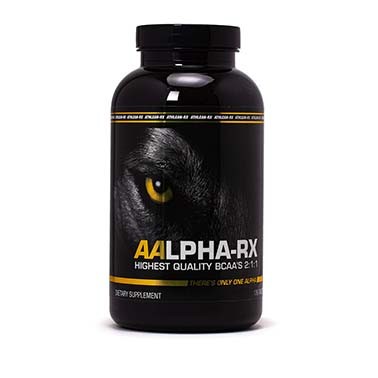
Moving on, we’ve got “AAlpha-RX,” which is a BCAA product.
This is not surprising, because it’s pretty clear that Jeff Cavaliere is completely out to lunch when it comes to supplement research or anything supplement related for that matter.
I don’t know how many times I have to go over this on my YouTube channel and on my blog, but, BCAA supplements are essentially worthless.
BCAAs just aren’t worth it
As I said earlier about glutamine, as long as you’re consuming enough daily protein from quality sources, then you shouldn’t have to supplement with other amino acids.
BCAAs are not anti-catabolic as many claim. You need the full spectrum of essential aminos for a true anti-catabolic effect. This can’t be had with just BCAA’s alone.
They do reduce muscle soreness, but only compared to a placebo. If you just eat a regular whole food protein source post workout, you’ll probably get the same effect.
BCAAs also reduce serotonin levels during training, which technically would reduce fatigue. However, they also lower l-tyrosine uptake into the brain as well, l-tyrosine being an important amino acid for promoting increased energy
And so, the overall effect on energy levels is probably marginal at best if anything. It’s already bad enough for anyone to be selling BCAA’s in 2021 when the research is clear that they aren’t benefits. Yet, our good friend Jeff and the team at Athlean-X takes it a step further by charging an outrageous price as well.
Overpriced fluff
The Athlean-RX BCAA’s give you 176 grams in total for the downright disturbing cost of 50 dollars per bottle, meaning you’re paying 28 cents per gram of BCAAs.
Most other BCAA powders are somewhere in the range of probably 8-10 cents per gram. You’re paying roughly 3 times the cost for this.
If you’re going to sell a completely worthless product to thousands of people, then at least have some mercy so that people are only flushing a little bit of extra cash down the toilet. Not $600 per year if they’re buying this consistently (FYI, this is not something I recommend you pay for).
Athlean X Pre-workout: X-Cite
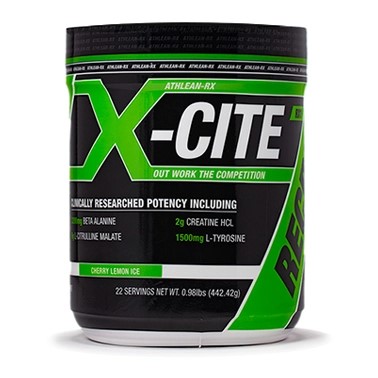
The previous 3 products we covered are genuinely awful, and the next two after this aren’t any better. But this is the one product from the Athlean-RX line that I would say isn’t too bad.
X-CITE is the Athlean-X pre-workout formula. It still has flaws, and I still wouldn’t recommend it since there are much better options out there. However, it’s somewhat reasonable overall.
Citrulline malate
Let’s start with what’s good. There’s 6 grams of citrulline malate, a solid ingredient for increasing muscular performance and reducing soreness. We include citrulline malate in our RealScience Athletics pre-workout PureForm, and at that same dosage.
L-tyrosine
Jeff also adds 1.5 grams of l-tyrosine. This is an amino acid that works synergistically with caffeine to increase mental alertness and reduce fatigue.
I’m also a fan of tyrosine and we also included it in PureForm. But we use 3 grams per serving rather than the 1 and a half here.
Caffeine
Of course, this product has caffeine. It’s a standard ingredient in most pre-workouts, and here Jeff uses 200mg, the same dosage that we also use.
So, those things are good.
Now is where it starts to go downhill.
Beta alanine
Beta alanine isn’t going to be helpful for the majority of people who are performing standard hypertrophy workouts.
Put simply, beta alanine is only useful for very high rep sets that last at least 1 minute or more. Most people are not going to be doing that, and even then, the benefits are pretty small.
On top of that, beta alanine isn’t even a pre-workout ingredient to begin with because it has no immediate or acute effects. It’s something you’re meant to take every day. The benefits of it slowly build up over time as your muscles become saturated with carnosine.
Because of this, it doesn’t make sense for supplement companies to put beta alanine in pre-workouts. People are going to need to buy it separately anyway to take on off days.
Furthermore, not everyone likes the beta alanine tingles you get on your skin. In reality it’s an ingredient that should be purchased separately on an “as-needed” basis depending on the person.
More fluff: Creatine HCL
Then there’s creatine HCL, which technically does saturate your muscles with creatine at a lower dose than you would need of creatine monohydrate.
But like Kre-Alkalyn, in terms of overall effects, creatine HCL is not superior to monohydrate in any way. Even with the lower dose, it still works out to be more expensive. And like beta alanine, creatine is not a true pre-workout ingredient either as it doesn’t have any immediate effects on your strength levels.
Betaine Anhydrous
He then sprinkles in another half dose of betaine anhydrous. This is also not a pre workout ingredient because it has no immediate effects on performance.
I’m really not sure why Jeff is so gung-ho about betaine because it seems to be in every Athlean-X product he sells. In reality, it’s just not that impressive of an ingredient. There’s also 1 gram of taurine, which I doubt will do anything for pre workout purposes—especially at that dose.
So overall, this pre-workout is not as bad as a lot of other pre-workouts on the market, but it’s still not something I would recommend.
The citrulline malate, tyrosine, and caffeine combination is good. However, the beta alanine and creatine don’t really belong, especially not creatine HCL. The betaine or the taurine also don’t make sense to include, therefore not justifying the higher price tag.
If you want to check out PureForm, which I formulated using a straightforward, effective combination of research-backed pre-workout ingredients in their proper dosages and for a reasonable price, check out RealScience Athletics.
Athlean X Intra-workout: PRX
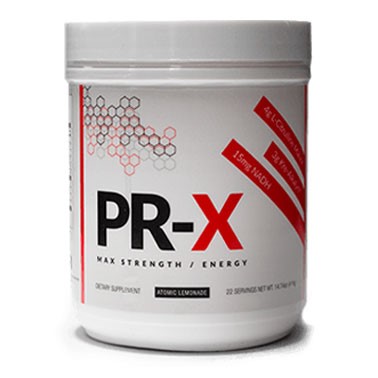
Next up is one of Jeff’s newest products, which is an intra workout supplement called PRX.
There’s 4 grams of citrulline malate here, which is a bare minimum dose if that’s all you’re taking. But if you’re using citrulline malate pre workout as well, then this could give you a small added boost.
Once again he adds in Kre-Alkalyn for no good reason whatsoever. As I said earlier, it is nothing but overpriced fluff, and creatine itself has no intra workout benefit anyway.
Then, he’s got a combination of coenzyme q 10 and NADH, which is another really strange addition. These compounds might have certain overall health and longevity benefits when they’re taken continuously over a prolonged period. But as far as intra workout benefits go, they’re just not going to have any significant immediate effects on training performance. He’s using minimal dosages as well anyway.
Again, I have no idea what the thought process here was aside from a potential marketing angle. There’s no real rational basis behind this formulation for intra-workout purposes, and to make matters worse, it’s 50 dollars a bottle.
Just like the rest of Jeff’s products, they are very, very overpriced for what you’re getting.
This is likely not because the production cost is so high that they have no choice but to charge more; instead, they’re pricing it that way because they know they can, and they know people will pay more for the Athlean-X brand. It’s really that simple.
In Conclusion…
I don’t think I need to make a closing statement here to sum up my views.
Considering you’ve made it this far, it should be pretty obvious what I think about the Athlean-X supplement line.
If you’re interested in no B.S., science-based supplements with clinically proven ingredients that work, check out my supplement line over at Real Science Athletics, and use the coupon code RS10 for 10% off your first purchase.
If you found this article helpful, make sure to sign up for your FREE custom fitness plan below...


